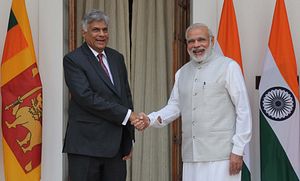The prime ministers of India and Sri Lanka met for the first time since the latter’s parliamentary elections in late August. Ranil Wickremesinghe, the prime minister of Sri Lanka with a renewed mandate in the wake of parliamentary elections, met Indian Prime Minister Narendra Modi in New Delhi. The visit marked Wickremesinghe’s first overseas trip since the elections and highlights the importance Sri Lanka attaches to its relations with New Delhi, a close partner historically.
Referring to both the January presidential elections, in which Maithripala Sirisena unexpectedly unseated Mahinda Rajapaksa, and the August parliamentary elections, which reinforced the reform mandate of Wickremesinghe and the United National Front for Good Governance coalition, Modi applauded Sri Lanka’s “historic year.” “Sri Lanka has voted twice this year for change, reforms, reconciliation and progress,” he added. Wickremesinghe’s visit had a broad agenda, encompassing economic and security relations. The two leaders pledged to improve economic ties between the two countries and simultaneously expand security cooperation in the Indian Ocean. For India, which seeks to exercise dominance over the economically critical sea lanes of the Indian Ocean, close security ties with Sri Lanka are an important strategic priority. Modi applauded Sri Lanka’s political transitions over the year.
Acknowledging this imperative, Wickremesinghe remarked that “When there is stability in the Indian Ocean, India and Sri Lanka prosper, and when there is instability, we get affected.” The Sri Lankan prime minister is keenly aware of the anxieties that emerged between New Delhi and Colombo during the long years of Mahinda Rajapaksa’s rule in Sri Lanka. Under Rajapaksa, Colombo welcomed a profusion of Chinese investment in critical civilian infrastructure projects, leading to concerns that China had succeeded in supplanting New Delhi’s influence across the Palk Strait. Indian observers had grown doubly concerned when, in late 2014, Chinese naval assets, including a warship and a submarine, were spotted at a Sri Lankan civilian port, lending credence to Indian fears of China incorporating Sri Lanka into its network of Indian Ocean civilian port facilities.
Beyond security ties, Wickremsinghe and Modi broached the equally important topic of economic relations between the two countries. According to Reuters, the two countries hope to conclude an economic partnership agreement by the end of the year. “We are looking at a permanent agreement on cooperation on economic affairs – trade, investment and technology – which is essential for development,” Wickremesinghe told the press after meeting with Modi. “We both want deeper economic engagement,” Modi added, noting that India sought to invest in Sri Lankan infrastructure, energy, and transportation sectors.
Sri Lanka’s foreign policy doesn’t appear to be poised to move entirely away from China. Rather, under the leadership of both Sirisena and Wickremsinghe, the country appears to be “rebalancing” its policies. In relative terms, India will come to play a greater part in Colombo’s outlook than it did in the Rajapaksa era. Though Colombo is investigating the terms under which contracts were awarded to Chinese firms under the previous government, Sri Lanka and China continue to cooperate on a range of issues.

































